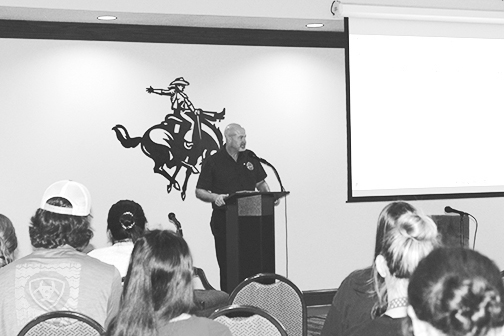By ELY NOBLE
Senior Reporter
Northwestern Oklahoma State University hosted its annual Constitution Day lecture Sept. 26, with a public discussion on the U.S. Constitution, the supreme court, and the 2024 presidential election.
The event, brought together by the university’s institute for citizenship studies and the department of social sciences, took place from 1-3 p.m. in the Ranger Room on the Alva campus.
This year’s theme, open forum, The U.S. Constitution, the Supreme court and the upcoming Presidential Election featured an interactive conversation led by Dr. Eric Schmaltz, professor of history and chair of the department of social sciences, and Dr. Aaron Mason, professor of political science.
Dr. Mason said events like Constitution Day give an important platform for getting a clear look at the Constitution within context of politics and social issues.
“The Constitution is the foundation of our democracy, and it’s important that we revisit it, especially in the context of current events,” Mason said. “The Supreme Court plays a significant role in shaping policy, and with the upcoming presidential election, these conversations are more crucial than ever.”
One of the key topics discussed during the forum was the ongoing case Trump V. United States, which has gained national attention.
Dr. Mason gave insight into the constitutional and legal indications of the case, which focuses on former President Donald Trump’s alleged handling of documents after leaving office and the federal investigation.
Mason highlighted the case as an example of how the Constitution, especially Article II and executive privilege, is being tested in real-time.
“The Trump v. United States case is significant because it raises fundamental questions about the limits of presidential power, executive privilege and accountability under the law,” Mason said. “It’s not just about one individual, but rather how we interpret the Constitution’s provisions when dealing with former presidents.”
One of the man issues in Trump v. United States is the question of presidential immunity.
Which is a legal protection that usually protects current presidents from certain legal actions while in office.
Dr. Mason said that this case is different because it involves a former president, not a current one.
“Presidential immunity typically shields sitting presidents from civil suits and criminal prosecution related to their office duties,” Mason said. “However, Trump’s case is unprecedented in that it involves actions taken after he left office. The legal question is whether former presidents can claim immunity from prosecution for actions taken during their presidency, or in this case, after they’ve left office.”
Mason said that while the courts have generally upheld immunity for current presidents, there is less clarity when it comes to former presidents.
How the court in this case could set a new standard for what protections former presidents have once they leave office.
The event was free and open to the public, giving people a chance to discuss the U.S. Constitution and how it impacts the country’s political future.

